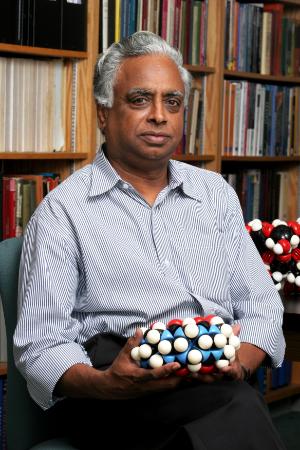A leading chemist from the University of Miami (UM) College of Arts & Sciences has been selected as a Fulbright-Nehru Distinguished Chair, a program administered by the U.S. Department of State’s Bureau of Educational and Cultural Affairs and the India-based United States India Educational Foundation, to conduct scientific outreach activities in India.
 |
|
V. Ramamurthy, professor of chemistry, has received |
V. Ramamurthy, professor of chemistry and former chemistry department chair at the UM College of Arts & Sciences, is one of just four scholars from America (including all arts, science, engineering, and medical disciplines) to be named a 2014 Fulbright-Nehru Distinguished Chair. This prestigious program sends full professors to India for four months, to teach graduate-level classes, deliver guest lectures, participate in conferences, and assist with program development/curriculum design.
Each professor selects a “host institution” as a home base. Ramamurthy will be working with the Indian Institute of Science in Bangalore, India, the nation’s top scientific academy. For Ramamurthy, it will be a homecoming of sorts – he served as a faculty member there for nearly a decade in the 1970s-1980s, just after completing his Ph.D. and post-doctoral work in the United States.
Ramamurthy is uniquely qualified for this fellowship. His proposal stated: “My distinct experience as an educator, researcher and administrator I believe would be of value to institutions, students, young researchers and administrators involved in building the science infrastructure in India.”
Ramamurthy said he has three main goals for his time in India:
- To help his colleagues there as they work to build and strengthen a scientific infrastructure.
- To initiate a program titled “Conversations on Chemistry” that would motivate young people to pursue the field.
- To build relations with Indian scientists and institutions.
He will also focus on designing a rigorous training program for middle- and high-school-level science teachers in India through Talent Development Center of the Indian Institute of Science.
Ramamurthy wrote, “My primary aim is to teach what I have learned in the USA and learn what India has to offer as it attempts to become a significant partner in the accumulation of scientific knowledge.”
He said, “There are a lot of good scientists in India now,” adding that many highly trained scientists now tend to stay in India after their schooling rather than going to foreign countries (such as the United States).
Due to the government-mandated retirement age of 65, many of the scientists with whom he has collaborated throughout his career will soon be leaving the field, Ramamurthy said. He is looking forward to connecting with the “new guard.”
He wrote, “At a time of decreasing interest and investment in science in the USA, India is investing significantly in science, rapidly building institutions, and encouraging young students to pursue careers in science. Scientific resurgence in the 1930s and 1940s occurred through our willingness to learn from European friends. This may be the time for us to learn and implement the methods adopted by our Asian friends. In this context, it would be desirable to experience the ongoing scientific revolution in these countries first-hand.”
“For society to survive, we need to nurture science,” Ramamurthy said.
Ramamurthy is a noted chemist. He has experience in the private sector as well as academia, spending seven years working at The DuPont Company. He came to UM from Tulane University, where he was Bernard-Baus Professor of Chemistry for 10 years. A photo-chemist, Ramamurthy’s current research focuses on how molecules that are in confined spaces respond to light.
He will leave for India in January 2015. During the Fall Semester sabbatical from UM, Ramamurthy will also serve as a Japanese Society for Promotion of Science Invitational Fellow in Tokyo, a similar program to the Fulbright funded by the Japanese government. He plans to complete the sabbatical by visiting China for two months as a Chinese Academy of Sciences Visiting Professor.

